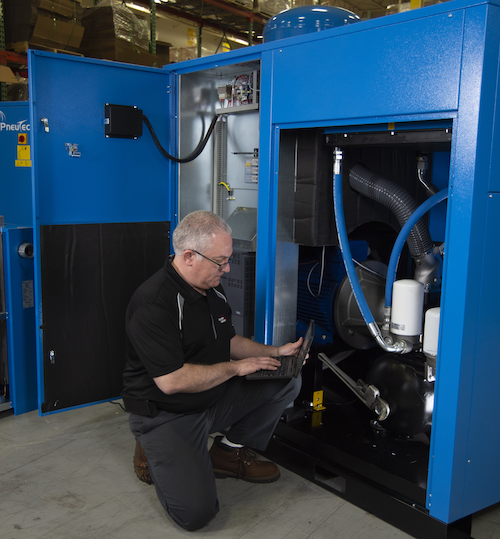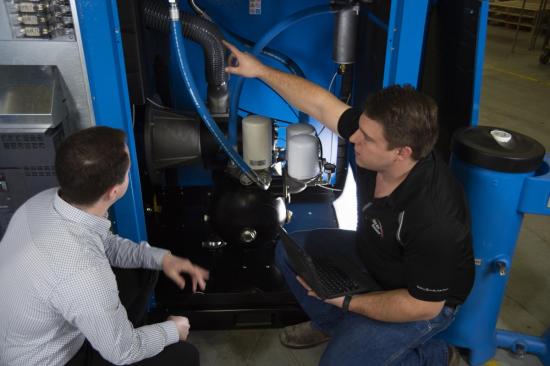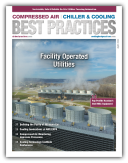When you take care of your air compressor, it will continue to take care of you. Following the recommended preventive maintenance procedures as outlined by the manufacturer will extend the life of your air compressor, save energy costs and reduce the risk of unexpected downtime. Here’s what facility managers should know about air compressor preventive maintenance — and when to call the experts.

Preventive maintenance goes a long way toward extending the life of an air compressor.
How Preventive Maintenance Saves Money
Preventive maintenance increases the life of your air compressor and ensures its safe, reliable and efficient operation. It also will save you money in the long term. Cost savings and other benefits include:
- Energy: Overloaded filters, blockages, inadequate lubrication, and other problems cause your air compressor to work harder than it should have to. That means you’re paying more in energy costs. Maintaining your system for maximum efficiency will show up as savings on your energy bill.
- Equipment life: When you take care of your air compressor and other compressed air system components, they last longer — an automatic savings.
- Repairs: Emergency repairs are almost always more expensive than standard preventive maintenance. Regular preventive maintenance catches little problems, such as a worn belt or an oil leak — before they lead to more extensive (and expensive) damage to your system. You’ll also avoid after-hours or overtime charges associated with emergency repair calls.
- Productivity: Regular preventive maintenance will also help you avoid the costs of an unexpected shutdown on your production lines. It can be scheduled for times when they will cause the least disruption to your production schedule. If you have a backup air compressor, you may be able to keep lines running when preventive maintenance is performed.
- Air quality: Airstream contamination from corrosion or fluids in the compressed air system can cause problems for many production processes. Consistent monitoring and proper maintenance of filters, air lines and other air compressor components will prevent buildup of fluids and particulates that can make their way into the airstream.
- Safety: Regular maintenance is also necessary to reduce the (small but possible) risk of a fire or air receiver tank rupture. Misuse or poor maintenance can lead to problems such as short-cycling of the air compressor motor, over-pressurization, failure of relief valves or other problems that make a fire or explosion more likely. These risks can be all but eliminated with proper operation and regular inspection and maintenance of system components.
Air Compressor Maintenance: The Checklist
Compressed air system owners should follow all recommended preventive maintenance procedures in their owner’s manual. The exact checklist and recommended intervals will be specific to the type and model of your air compressor and your usage patterns. If you are not sure, check with your air compressor manufacturer or supplier.
Routine preventive procedures for compressed air systems include:
- Drain excess fluids daily from the air compressor and air receiver tank (if not using an automatic drain valve).
- Change the oil and replace the oil filter at recommended intervals, typically ranging from 1,000 to 2,000 hours of use for the oil filter, and 4,000 to 8,000 hours for the oil. The oil filter should be checked frequently and changed earlier if it shows signs of excessive loading or pressure drop.
- Change the air filter on a regular basis (will vary depending on air compressor usage and the environment in which it is running).
- Change the air/oil separator annually or every 4,000 to 8,000 hours to reduce pressure drop and allow the air compressor to push the compressed air out to the system easily. Old air/oil separators are not only inefficient but can allow excessive oil carryover which can cause a multitude of other issues.
- Check lubrication of joints, bearings and moving parts and reapply as needed to prevent corrosion and wear.
- Check motor bearings frequently for signs of wear and corrosion and ensure that they are properly lubricated.
- Check belts for wear and ensure that they have proper tension levels.
- Inspect and clean intake vents to prevent dirt from getting sucked into the system.
- Inspect the air compressor for signs of oil leaks or air leaks.
- Check pressure relief valves to ensure that they are operating correctly and are not blocked or corroded in any way.
- Inspect pipes, hoses, hardware and air receiver tanks for integrity on a regular basis.
You will also want to monitor other aspects of system performance, such as pressure drop, temperatures, vibration, voltage levels and air dryer performance. Anomalies can alert you to a potential problem that may require repair by an air compressor expert.
Check with your air compressor manufacturer or supplier when it comes to routine preventive maintenance procedures.
When to Call a Professional
Daily and weekly maintenance activities (such as draining fluids and checking lubricants) can and should be performed by facility maintenance staff. If your staff has training and expertise in air compressor maintenance, they may also be able to perform more in-depth regular preventive maintenance procedures. However, for most facilities, it makes sense to call in an expert for a full preventive maintenance checkup. A professional certified by your air compressor manufacturer or supplier will pick up issues that non-experts are likely to miss.

It is often a good idea to call in an expert for a full preventive maintenance checkup.
Here are some times you may want to call in an expert:
- Diagnosing pressure drop: Pressure drop refers to the loss of pressure between the air compressor and the endpoint where the air is utilized. While some pressure loss is normal, excessive pressure drop may indicate a leak or blockage somewhere in the system. Ignoring the signs of pressure drop or increasing operating pressures to compensate will drive up energy costs and put added strain on the system. A certified compressed air system technician can find and fix compressed air leaks, clogged filters or other issues causing excessive pressure drop.
- Safety inspections: Periodically, your system should be shut down for a complete safety inspection. The inspector will thoroughly examine all parts of the system to look for wear, corrosion, faulty gauges and valves, electrical problems and other issues that could present a safety concern. This should be done by a certified technician who understands what to look for.
- Repairs: While in-house maintenance staff can probably replace an air filter or belt, more complicated repairs should be handled by a trained compressed air system specialist. A qualified technician can identify and mitigate emerging issues — such as minor bearing vibration or corrosion in the air lines — before they become a serious problem. Taking care of these repairs as they emerge will help you avoid a more serious and costly mechanical breakdowns.
Air Compressor Technology Monthly e-NewsletterWith a focus on Supply-Side Optimization, air compressor technologies and compressor control systems are profiled. System Assessment articles detail what compressor controls allow kWh consumption to match system demand. |
What to Look for In a Maintenance Provider
If you don’t have someone with specific expertise in compressed air systems on staff, it makes sense to find a certified provider to handle preventive maintenance, safety inspections and repairs. Here are some things to look for.
- Expertise: Does the provider have specific expertise in air compressor maintenance and repair? Are their technicians certified? What is the level of education, expertise and experience of the technician who will be servicing your air compressor?
- Convenience: Will they work around your production schedule and work with you to minimize costly disruptions?
- Professionalism: Are the technicians who will be working at your site clean, courteous and professional?
- Responsiveness: How fast can they get there if an emergency repair is needed? Can you get someone on the phone or by email if you have questions about your air compressor?
- Service agreements: What kinds of service agreements does the provider offer? Do they have a plan structured around your needs? A good provider may offer multiple levels of service agreements to meet your needs, ranging from simple reminder services, to flat-rate scheduled preventive maintenance procedures, to comprehensive packages that cover all or some of the costs of repairs, rentals and more.
Air Compressor Lubrication & Maintenance - Webinar RecordingDownload the slides and watch the recording of the FREE webcast to learn:
|
A good service agreement can help you manage your budget and avoid unexpected surprises when it comes to preventive maintenance and repair costs. The level of service you need may depend on the expertise you have on staff, the usage patterns for your compressed air system, and the age of your air compressor and other system components.
Preventive maintenance is a long-term investment in your air compressor. It’s worth getting it right, whether you are doing it yourself or calling in the pros.
About the Author
Derrick Taylor is the co-owner of Fluid-Aire Dynamics and co-founder and General Manager of PneuTech USA. He brings more than 20 years of direct experience in compressed air service, installation, sales and system design.
About PneuTech USA
PneuTech USA is part of the global PneuTech Group. We specialize in the design, manufacture, and supply of high-performance air compressors, refrigerated dryers, desiccant dryers, nitrogen generators, in-line filtration, condensate separation, tanks, drains, and accessories. PneuTech equipment is available through a growing network of distributors and backed by industry-leading warranties.
Our leaders had a simple vision. They wanted to utilize their many years of industry experience to create a brand that offered a superior buyer journey with quality products, and personal service. We strive to be the preferred global brand for compressed air solutions with best-in-class reliability, value, and support. We are committed to producing positive results through being trustworthy, ethical, and accessible. We are founded in the beliefs that through working together we can continue to transform the industry, while rising to turn challenges into opportunities. For more information, visit https://pneutech.com/usa/.
About Fluid-Aire Dynamics
Fluid-Aire Dynamics is a leading distributor of industrial compressed air equipment in the Chicago, Milwaukee, Minneapolis and San Antonio markets. For more information, visit https://fluidairedynamics.com/.
All photos courtesy of PneuTech USA.
To read more Air Compressor Technology articles, please visit www.airbestpractices.com/technology/air-compressors.




